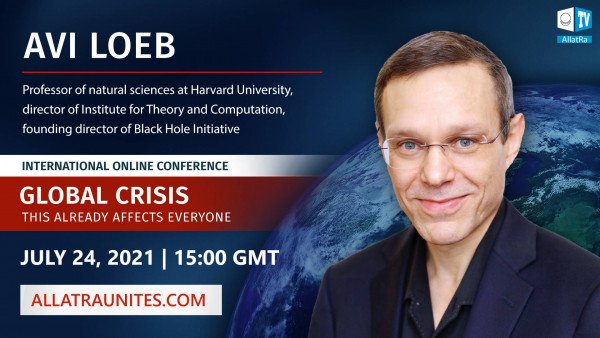Prof. Avi Loeb
Theoretical physicist, Professor of Science at Harvard University, director of Institute for Theory and Computation, founding director of Black Hole Initiative (Israel/USA)
Speaker Bio
Professor Loeb received a PhD in plasma physics at the age of 24 from the Hebrew University of Jerusalem and was subsequently a long-term member at the Institute for Advanced Study in Princeton, where he started to work in theoretical astrophysics. He is now the Frank B. Baird Jr. Professor of Science and former chair of the department.
He also holds a visiting professorship at the Weizmann Institute of Science and a Sackler Senior Professorship by special appointment in the School of Physics and Astronomy at Tel Aviv University.
Prof. Loeb is chair the Breakthrough StarShot Advisory Committee and the National Academies' Board on Physics and Astronomy. He is a member of the US President's Council of Advisors on Science and Technology at the White House.
In December 2012, Time magazine selected Loeb as one of the 25 most influential people in space.
Loeb is the author of almost 700 scientific articles and books, including:
"Extraterrestrial: The First Sign of Intelligent Life Beyond Earth Hardcover" (2021)
"Life in the Cosmos: From Biosignatures to Technosignatures" (2021)
"From the First Star to Milkomeda" (2015)
"How Did the First Stars and Galaxies Form?" (2010)

Speech
Greeting everyone in the conference “Global Crisis. This Already Affects Everyone”! It is my great pleasure to join you.
My name is Avi Loeb. I'm a professor of science at Harvard University, and I was asked at the forum recently “How do I define an intelligent civilization?” And the way I define it, - this is a civilization that follows the guiding principles of science, namely cooperation and sharing of evidence-based knowledge. And it is pretty clear right now that our problems are global.
The biggest risk that humanity is facing at the moment is that we are wasting a lot of resources on fighting each other and trying to feel superior relative to each other. And just think about that. If the same resources were used for following church's original vision, we would know the answer whether we are alone or not, and we would be able to have a better assessment of reality around us and better aspirations for space.
That’s one example of how science and technology can help humanity and our many other challenges that face us, including climate change, providing enough food for everyone and providing education. And I believe that science and technology carry the promise for a much better world for all of us, globally, in the distant future. And of course, that involves also going out of Earth. Because currently all our eggs are in one basket here on Earth, and if a catastrophe happens, everything that we care about will go away. So going to space is extremely important and that's one of the frontiers that humanity is facing.
Of course, that's very idealistic, because different nations have different national interests. But the more global our thinking is, the better cooperation we would get. And the best example is, - I'm a scientist and I can go anywhere in the world and speak with people in my profession. Even if we've never met before, we would still be able to cooperate and work together and share information.
And that, to me, is the ideal world where we don't try to feel superior relative to each other, we are not thinking about superficial things like the color of the skin, the ethnic origin, that's really secondary to our main goals, which are to help each other in trying to have a better future.
And that we can do much better if we cooperate rather than create our own silos inside nations and try to dominate other nations. And I do feel that that's the intelligent way towards the future.
I think it's extremely important for everyone to be engaged. Moreover, I think that academia should not be considered as an occupation of the elites. In fact, everyone can be engaged in the scientific process. And I think it's important for scientists to explain what they are doing. It's important for people that develop technologies, to attend to the needs of people that use those technologies, and all together it’s society and scientists and technologists working together towards solving the problems that matter to society. It makes no sense for people in academia to work on problems like how many angels can sit on the tip of a pin, because even though it can demonstrate that they might be smart or sophisticated, it does not promote our knowledge on issues that matter to most people.
And one example that I recognize these days is the question of: are we the smartest kid on the block? Our civilization. Or are there other civilizations out there that might be even smarter than we are and we can learn from them? And I think the public is fascinated with this question, but it never gained attraction within the academic community and it should, it should become mainstream because we have the ability to address it.
Another important aspect is going to space. And I think currently we are all worried about what happens here on Earth. But eventually, we want to have communities that are not just on Earth, but are in many other places away from Earth.